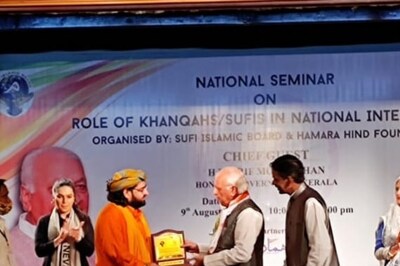
views
The third industrial revolution, which started with advances in computing in early 1970s, is quickly running its course. With advances in processing power, machine learning, artificial intelligence and expansion of global network, the days of isolated systems and organisations are numbered. The next big wave of change seeks to connect the devices we interact with through Internet of Things, build computation systems in the cloud to run them and use AI to continuously improve the user experience. Consumer devices might be the only way the majority will experience this fourth industrial revolution. But invisibly, we are headed for a revolution in the way economies are organised, controlled and the value is produced.
This fourth industrial revolution, also called Industry 4.0, is the main theme of ongoing World Economic Forum annual meeting in Davos, Switzerland. World leaders, bureaucrats, CEOs and academicians are discussing the advantages and challenges of the 4th industrial revolution.
India gained tremendously from the third industrial revolution. It produced pioneers in Information Technology industry that powers much of the global industries, from manufacturing to banking and retails. Although India skipped the hardware manufacturing part of the third revolution, the country has become the global center of IT services in the last three decades and has driven the third revolution. Market liberalisation and economic policies conducive to bringing millions of jobs to India resulted in rapid economic growth.
However, all transitions involve their own challenges and the fourth revolution is not an exception. With every global paradigm shift, there are winners and losers. India faces three key challenges in this transition and they relate to employment for its labor force, competitiveness of its firms and sustainability for everyone.
Employment opportunities come under severe pressure in any global transition. Automobiles made the horse carriage and rickshaws obsolete, computers made clerks obsolete and ATMs have made bank tellers obsolete. However, these obsolescence also resulted in faster transportation, more efficient workplace and expansion of banking network. According to one World Bank study, automation threatens 69% of jobs in India but emerging technologies will also create new jobs in the right economic environment. India now has around 40 lakh app developers, a job that did not exist three decades ago.
The times of retiring from the same company you joined as a youth are a relic of the past already, but the fourth revolution might even necessitate flexibility to change profession mid-career. A World Economic Forum’s report suggests that more than half of Indian workforce would need to acquire new skills to meet the talent demands of the future.
In order to capitalize on new opportunities, India needs to focus on conceptual learning in schools, technology training, technology adoption, encourage automation at the individual level and develop a skill application mindset. Skills such as higher mathematics, programming, problem solving, and critical thinking are portable and helpful in every profession. Skills addition even after college, through online courses or on-the-job training need to be encouraged. These nudge towards technology will help people realise the benefits of services it provides. Consequently, workers will be better prepared to meet the talent demands required by the technology.
In order to make the country more competitive in the 4.0 era, firms must be nudged and incentivised to think, adapt and invest for automation, innovation and efficiency. Currently, automated robots are rare in Indian manufacturing, restricted to tasks such as welding in automotive industry. This is partly reflective of Indian manufacturing’s poor competitiveness in the global markets. But shying away from automation will jeopardize the recent push to Indian manufacturing, as global manufacturing moves to make industrial robots even more smart and productive. The government needs to create specialized loans schemes that help industries adopt complex industrial technologies at affordable rates. These technologies will not only train the human resources but also add to the nation's competitiveness.
The path of each industrial revolution was paved by a major energy transition. Steam power led to first industrial revolution, electricity to the second and nuclear power to the third. The 4.0 era will be led by green energy and sustainability. With rapid addition of renewable energy to the grid, India has a lead over rest of the world in this respect.
At the same time, our cities and rivers are among the most polluted in the world. The current rate of consumption is threatening the planet. In the western world, there is a growing interest in repair, reuse and recycling of consumer products to reduce the negative impact of excess consumerism. Termed ‘circular economy’, the concept is very much a part of Indian middle-class value system. Using 4.0 technologies, the cost of reverse logistics can even be lowered and waste be reduced.
Rising incomes, aspirations and advances in e-commerce technologies will greatly increase consumption across all product categories. But the internet can also create and foster sharing economies, where ownership of a few goods could be easily shared (or serviced) with others.
To gain the most from the fourth industrial revolution transition, India needs to address these challenges. Failing to do so can lead to economic stagnation. The 4.0 globalisation theme of world economic forum comes at the right time. Indian policymakers, business leaders and academicians must jointly work towards a roadmap so that transition costs are minimized and gains maximized.
With co-writer Anirudh Agrawal
Ashish Tyagi is a postdoctoral researcher at Frankfurt School of Finance & Management.
Anirudh Agrawal is part of International research and Analytics team at Frankfurt School of Finance & Management




















Comments
0 comment